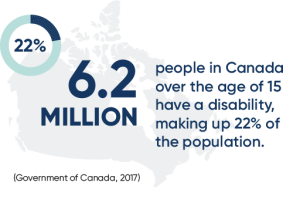Download the 2024 DEIB Calendar
The Impact of Employing People with Disabilities
According to data collected by the Government of Canada in 2017, 6.2 million people in Canada over the age of 15 have a disability, making up 22% of the country’s population.

In 2021, the Canadian Government conducted a study to better understand the experience of this population, taking specific care to examine their experience with the workplace. It was shown that organizations that adopted inclusive hiring and retention practices in their workplace were more likely to: 08-disability-and-inclusion-and-accessibility-1025-en-pr.pdf (canada.ca)
- 1. Meet or exceed their financial targets,
- 2. Be high-performing businesses,
- 3. Show innovation in the field and
- 4. Achieve better business outcomes.
Yet, individuals with disabilities have the lowest rate of employment within the workplace and are more likely to be unemployed or underemployed as compared to those individuals without disabilities. Approximately 58% of young adults with autism have never worked between high school and their early 20s (Roux, Shattuck, Rast, Rava, & Anderson, 2015). In addition, this group is disproportionately under-employed compared to their peers without such a diagnosis. This same assumption can be broadened to accommodate many other unique disabilities experienced by Canadians.
Top 3 Lectures on the Day
- 1. “Perceptions of Barriers and Facilitators for Individuals with Autism in Job Interviews
Employers and service providers should improve the interview process by offering candidates clearer expectations, replacing open-ended questions with skill-based assessments, and encouraging interviewers to provide more guidance and feedback. Research indicates that around 58% of young adults with autism have worked in their early 20s but face higher rates of underemployment compared to their peers. The research, based on feedback from employers, Autistic job seekers, and service providers, highlights the barriers and facilitators in job acquisition for Autistic individuals. The learning outcomes include understanding interview process barriers, supporting Autistic individuals, and reshaping interview practices to hire neurodiverse individuals, particularly those with autism.
- 2. “Best Practices for Disability Management in the Workplace”
This course offers an introductory overview of disability management best practices, providing the foundations to develop workplace strategies and resources. It covers the basics of disability understanding and management, emphasizing the benefits of implementing effective disability management systems. The course encourages a systems approach, transitioning from knowledge to action, including accommodation and Return To Work (RTW) considerations. Participants engage in practical activities to apply these concepts in their organizations, aiming for legal compliance, workplace diversity, and inclusive disability management. The course focuses on providing simple, actionable steps for practical implementation and improvement.
Part 1: Best Practices for Disability Management in the Workplace (workwellnessinstitute.org)
- 3. “Experience of Employees with Disabilities”
In this course, we will delve into the findings of a grounded theory study examining the treatment of employees with disabilities in the workplace. Key discussion points will encompass the various forms of treatment experienced by participants, the emotional impact of mistreatment at work, employee responses to such mistreatment, and the interplay between individual factors, disability, and the workplace environment in shaping the treatment of employees with disabilities. Our exploration will culminate in a conversation about how disability service providers can collaborate with all relevant parties to promote the inclusion of employees with disabilities in the workplace.
Experience of Employees with Disabilities (workwellnessinstitute.org)
A Message from Our CEO
“At the Work Wellness Institute, we believe that creating a more inclusive and diverse workplace benefits not only our employees but also our entire community. On this International Day of Persons with Disabilities, we are reminded of the importance of recognizing and celebrating the unique abilities and talents of all individuals, and I believe organizations need to reflect the communities they serve. I am proud of the work our organization does to support this day and our ongoing commitment to diversity, equity, inclusion, and belonging. Together, we can build a better and more inclusive future for everyone.”
—Cameron Stockdale, CEO and President of the Work Wellness Institute
